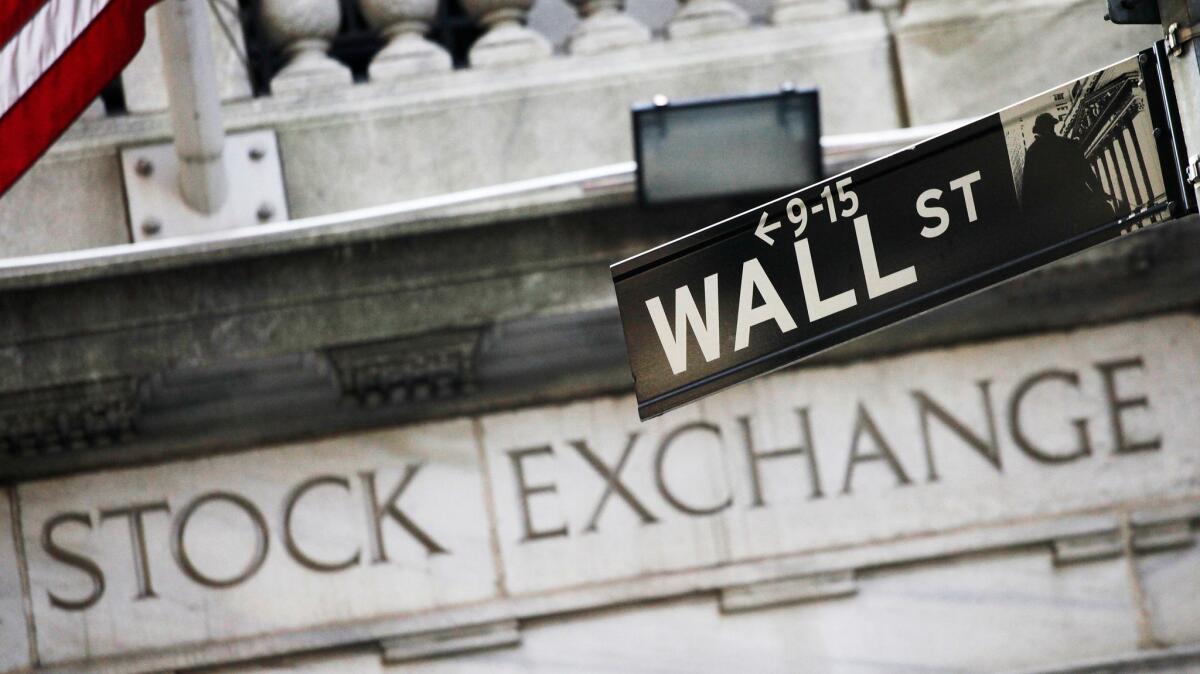Stocks barely move as calm returns to the market

U.S. stocks were nearly flat Monday, as the Standard & Poor’s 500 index steadied following back-to-back losses the last two weeks.
This week may be a calmer one for the stock market, after an uncharacteristically bumpy stretch shook what had been an incredibly smooth ride higher for stocks this year. Few market-moving events are on the calendar this week, and the highlight probably will arrive when central bankers from around the world gather in Wyoming as the weekend approaches.
Major U.S. indexes flipped between small gains and losses throughout the day. The S&P 500 ended up 2.82 points, or 0.1%, at 2,428.37. The Dow Jones industrial average rose 29.24, or 0.1%, to 21,703.75. The Nasdaq composite slipped 3.40 points, or 0.1%, to 6,213.13.
The modest moves were a return to form for the market. This year has had only four days when the S&P 500 has dropped more than 1%, which is well below the typical number in recent decades. But half those instances occurred in the last two weeks, stoked by worries about discord in Washington and the potential for war.
“One of the reasons the market has held in and performed well recently — although it’s wobbled a bit in the last two weeks — has been earnings,” said Ernie Cecilia, chief investment officer at Bryn Mawr Trust. “Without the earnings that we saw, it would have been a much more difficult period.”
Companies are mostly done reporting their results for the spring quarter, and their growth in profits was stronger than analysts expected. Not only that, but businesses also reported higher revenues. That’s encouraging given the struggles many companies have had in recent years to grow in the still-sluggish global economy.
Cecilia said he sees few potential drivers that could move markets much in either direction in the coming weeks, and he expects the market to “trade in some sort of sideways fashion.”
One highlight could be the upcoming gathering in Jackson Hole, Wyo., for central bankers, economists and policymakers. Federal Reserve chief Janet L. Yellen and European Central Bank head Mario Draghi are expected to speak at the symposium, which begins Thursday and is hosted by the Fed’s Kansas City regional bank.
Tremendous stimulus from central banks has been one of the main reasons for the stock market’s surge since the Great Recession. But the Federal Reserve is now slowly raising interest rates and preparing to pare down the vast trove of bonds that it bought after the 2008 financial crisis. Investors are wondering when the European Central Bank may follow suit.
Jackson Hole has been the site of market-moving news in the past, including in 2010 when then-Fed chief Ben Bernanke signaled that the central bank may embark on another round of bond buying to shore up the economy.
Another wildcard for markets lies in Asia, where U.S. and South Korean forces started their annual joint military exercises Monday. Tensions with North Korea are higher than usual, and Pyongyang in the past has responded to the drills with weapons tests and belligerent rhetoric.
In the U.S., mining companies helped to lead the market after prices for metals and other commodities rose. Freeport-McMoRan had the biggest gain in the S&P 500, up 4.1% to $14.73. Newmont Mining rose 2.2% to $36.61.
Gold rose $5.10 to $1,296.70 an ounce. Silver rose 2 cents to $17.02 an ounce. Copper rose 4 cents to $2.98 a pound.
Investors snapped up dividend-paying stocks as bond yields fell. Real-estate investment trusts were the best-performing sector of the 11 that make up the S&P 500.
Herbalife jumped 9.5% to $68.04 after the nutritional supplement company said that it was in talks to be acquired and taken private, but that those negotiations ended last week — and that in response to those talks, it is offering to buy back $600 million worth of its shares from existing investors in an auction.
On the losing side of the U.S. stock market, again, were athletic-gear companies. Foot Locker sank 7.4% to $31.82, the biggest loss in the S&P 500. Shares had tumbled across the industry Friday after Foot Locker and Hibbett Sports said revenue fell last quarter.
The yield on the 10-year Treasury note fell to 2.17% from 2.20%. The two-year yield slipped to 1.30% from 1.31%, and the 30-year yield fell to 2.77% from 2.78%.
The dollar fell to 108.85 yen from 109.26 yen. The euro rose to $1.1813 from $1.1760, and the British pound rose to $1.2901 from $1.2876.
Benchmark U.S. crude fell $1.14 to settle at $47.37 per barrel. Brent crude, the international standard, lost $1.06 to $51.66 a barrel.
Natural gas rose 7 cents $2.96 per 1,000 cubic feet, heating oil fell 5 cents to $1.57 per gallon and wholesale gasoline lost 4 cents to $1.58 per gallon.
In Asia, South Korea’s Kospi index slipped 0.1%, Japan’s Nikkei 225 index fell 0.4% and the Hang Seng in Hong Kong rose 0.4%.
In Europe, France’s CAC 40 fell 0.5%, Germany’s DAX lost 0.8%, and the FTSE 100 in London slipped 0.1%.
UPDATES:
5:35 p.m.: This article was updated with closing prices, context and analyst comment.
7:50 a.m.: This article was updated with market prices and context.
This article was originally published at 7 a.m.
More to Read
Inside the business of entertainment
The Wide Shot brings you news, analysis and insights on everything from streaming wars to production — and what it all means for the future.
You may occasionally receive promotional content from the Los Angeles Times.










